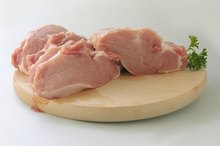Foods That Turn to Acid When You Eat Them
In nature, some foods, such as citrus fruits, are very acidic, but when they are metabolized in your body, they have an alkalizing effect, meaning they balance the acidity of your body's blood pH level. Maintaining this balance is important to stay healthy; too much acidity can put stress on the body and lead to illness. Strive to eat fewer acid-forming foods and more alkaline foods for better health.
Highly Acidic Foods
The most acidic foods are high in sugar and fat or highly refined, according to the Greenopedia website. White flour, white bread, white pasta, fried foods, jams and jellies, processed cheese, ice cream and soda are unhealthy for you not just because of their sugar and fat content but also because they can throw off the pH balance in your body. Other foods are nutritious but have a highly acidic effect on the body: some nuts, such as Brazil nuts and hazelnuts; whole-wheat foods; soybeans; seafood; and pheasant.
Low and Moderately Acidic Foods
Is Cranberry Juice Acidic or Alkaline?
Learn More
A host of other foods from all different food groups have a low to moderate acidic effect after consumption. These include egg whites, shellfish, white rice, veal, pomegranate, goat cheese, figs and cow's milk. Many beans have a moderately acidic effect, including adzuki, navy, pinto, garbanzo and red beans. Other acidic foods include corn, sesame oil, tomatoes, chicken, oat bran, veal, mustard and game meats.
- A host of other foods from all different food groups have a low to moderate acidic effect after consumption.
- Other acidic foods include corn, sesame oil, tomatoes, chicken, oat bran, veal, mustard and game meats.
Related Articles
References
- Dr. Lisa Weeks: The Negative Effects of Acidity in the Body
- Greenopedia: Alkaline-Acid Food Charts
- The Alkaline Diet: Is There Evidence That an Alkaline pH Diet Benefits Health?
- Higher estimates of daily dietary net endogenous acid production (NEAP) in the elderly as compared to the young in a healthy, free-living elderly population of Pakistan
- Effects of Dietary Acid Load on Exercise Metabolism and Anaerobic Exercise Performance
- Dietary acid load: A novel nutritional target in chronic kidney disease?
- Alkaline Diet and Metabolic Acidosis: Practical Approaches to the Nutritional Management of Chronic Kidney Disease - PubMed
- Associations between Dietary Acid-Base Load and Cardiometabolic Risk Factors in Adults: The Tehran Lipid and Glucose Study
- Association between dietary acid load and the risk of cardiovascular disease: nationwide surveys (KNHANES 2008–2011)
- Higher dietary acid load potentially increases serum triglyceride and obesity prevalence in adults: An updated systematic review and meta-analysis
- Higher dietary acid load potentially increases serum triglyceride and obesity prevalence in adults: An updated systematic review and meta-analysis
- Associations between Dietary Acid Load and Biomarkers of Inflammation and Hyperglycemia in Breast Cancer Survivors
- Hemoglobin A1c Levels Modify Associations between Dietary Acid Load and Breast Cancer Recurrence - PubMed
- Diet Soda Consumption and Risk of Incident End Stage Renal Disease
- Diet Soda Consumption and Risk of Incident End Stage Renal Disease
- The dietary acid load is higher in subjects with prediabetes who are at greater risk of diabetes: a case–control study
- Soda and Other Beverages and the Risk of Kidney Stones
- High Consumption of Soft Drinks Is Associated with an Increased Risk of Fracture: A 7-Year Follow-Up Study
- Associations between Dietary Acid Load and Biomarkers of Inflammation and Hyperglycemia in Breast Cancer Survivors
- Dietary acid load is associated with lower bone mineral density in men with low intake of dietary calcium
- Dietary Acid Load: mechanisms and evidence of its health repercussions - PubMed
- Dietary acid load: A novel nutritional target in chronic kidney disease?
- Dietary acid load: A novel nutritional target in chronic kidney disease?
- Higher dietary acid load potentially increases serum triglyceride and obesity prevalence in adults: An updated systematic review and meta-analysis
- Gastroesophageal Reflux Disease - StatPearls - NCBI Bookshelf
- Are Diet and Micronutrients Effective in Treating Gastroesophageal Reflux Disease Especially in Women?
- Dietary guideline adherence for gastroesophageal reflux disease
- Dietary guideline adherence for gastroesophageal reflux disease
- Dietary guideline adherence for gastroesophageal reflux disease
- Gastroesophageal Reflux Symptoms and Nutritional Preferences: Studies on Ethno-Medicine: Vol 9, No 3
- Development of scores assessing the refluxogenic potential of diet of patients with laryngopharyngeal reflux | SpringerLink
- Citrus fruits as a treasure trove of active natural metabolites that potentially provide benefits for human health - PubMed
- Dietary guideline adherence for gastroesophageal reflux disease
- Dietary guideline adherence for gastroesophageal reflux disease
- Don't eat tomatoes: patient's self-reported experiences of causes of symptoms in gastro-oesophageal reflux disease - PubMed
- Lycopene Quantity and Sources in the Diet of Healthy Young People
- Dietary acid load: A novel nutritional target in chronic kidney disease?
- Alkaline Diet and Metabolic Acidosis: Practical Approaches to the Nutritional Management of Chronic Kidney Disease - PubMed
- Associations between Dietary Acid-Base Load and Cardiometabolic Risk Factors in Adults: The Tehran Lipid and Glucose Study
- Association between dietary acid load and the risk of cardiovascular disease: nationwide surveys (KNHANES 2008–2011)
- Higher dietary acid load potentially increases serum triglyceride and obesity prevalence in adults: An updated systematic review and meta-analysis
Writer Bio
Jody Braverman is a professional writer and editor based in Atlanta. She studied creative writing at the American University of Paris and received a Bachelor of Arts in English from the University of Maryland. She also received personal trainer certification from NASM and her 200-hour yoga teacher certification from YogaWorks.









